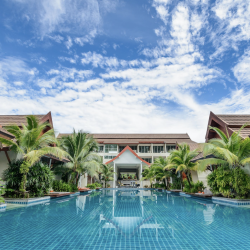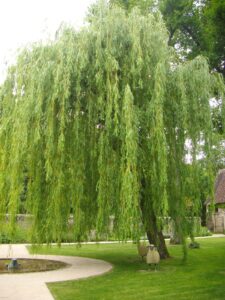Willow trees have long been admired for their graceful appearance and the tranquility they bring to any landscape. Hotels, in particular, often feature these majestic trees in their gardens or surroundings to enhance their aesthetic appeal. However, maintaining healthy willow trees can be a daunting task, especially in the face of various environmental challenges and diseases that can threaten their well-being. This is where Willow Tree Consulting comes into play, offering invaluable expertise and services to protect and preserve these precious natural assets. In this comprehensive guide, we will explore how hotels can benefit from Willow Tree Consulting to safeguard their willow trees, ensuring they continue to flourish for generations to come.
Understanding the Importance of Willow Trees
To appreciate the significance of Willow Tree Consulting, it’s essential to understand why willow trees are considered valuable additions to hotel landscapes:
Aesthetic Beauty: Willow trees are renowned for their graceful, weeping branches that create a serene ambiance, perfect for relaxation and enjoyment by hotel guests.
Erosion Control: Willow trees have extensive root systems that help stabilize soil and prevent erosion, making them ideal for properties with water features or challenging terrains.
Habitat for Wildlife: These trees provide habitat and food for various wildlife species, contributing to the overall ecological balance of the area.
Historical and Cultural Significance: Willow trees hold cultural significance in many societies and have been used for centuries in traditional medicines, crafts, and rituals.
The Threats Facing Willow Trees
Before delving into how Willow Tree Consulting can help hotels, it’s crucial to understand the threats that willow trees face:
Willow Scab: This fungal disease can defoliate trees, weaken branches, and inhibit growth.
Willow Canker: Caused by bacteria, cankers create sunken lesions on the tree’s bark, ultimately leading to branch dieback.
Invasive Species: Certain non-native insects and plants can wreak havoc on willow trees by consuming their leaves, stems, or roots.
Environmental Stressors: Extreme weather conditions, poor soil quality, and pollution can weaken willow trees and make them susceptible to diseases.
How Willow Tree Consulting Can Benefit Hotels
Now, let’s explore the ways in which Willow Tree Consulting can be a game-changer for hotels seeking to protect and maintain their willow trees:
Expert Diagnosis and Monitoring: Willow Tree Consulting employs certified arborists and tree care professionals who can accurately diagnose tree health issues and develop effective treatment plans.
Disease Management: The consulting firm specializes in the prevention and treatment of diseases like willow scab and canker, utilizing environmentally friendly methods to preserve tree health.
Insect Control: Willow Tree Consulting can implement integrated pest management strategies to control invasive insects and safeguard your willow trees.
Soil Analysis and Enhancement: They conduct soil tests to identify nutrient deficiencies and develop customized soil improvement plans to promote tree vitality.
Pruning and Maintenance: Regular pruning and maintenance services ensure that your willow trees maintain their graceful shape and remain structurally sound.
Environmental Stewardship: Willow Tree Consulting prioritizes environmentally friendly practices, helping hotels reduce their ecological footprint while preserving their natural assets.
Case Studies: Real-World Success Stories
To illustrate the tangible benefits of Willow Tree Consulting, let’s explore a couple of case studies where hotels have successfully protected their willow trees with professional guidance:
Hotel Serenity Retreat: Facing severe willow scab infestation, this upscale hotel sought the expertise of Willow Tree Consulting. Through diligent disease management and regular monitoring, they not only saved their existing willow trees but also planted new ones to enhance the landscape.
Riverside Haven Resort: Situated along a riverbank, this hotel’s willow trees were suffering from erosion and insect damage. Willow Tree Consulting devised a comprehensive plan that combined erosion control measures with insect management, resulting in healthier and more resilient willow trees.
The Long-Term Benefits for Hotels
Partnering with Willow Tree Consulting offers hotels a range of long-term advantages:
Enhanced Guest Experience: Maintaining lush, healthy willow trees creates a more visually appealing and peaceful environment for guests, boosting overall satisfaction and repeat bookings.
Increased Property Value: A well-maintained landscape, including healthy willow trees, can significantly increase the market value of a hotel property.
Sustainability and Brand Image: Demonstrating a commitment to environmental sustainability through tree preservation aligns with the values of many modern travelers and can enhance a hotel’s brand image.
Regulatory Compliance: In some regions, there may be regulations in place to protect specific tree species, including willow trees. Willow Tree Consulting ensures that hotels stay compliant with such regulations.
Conclusion
Willow trees are not just beautiful additions to hotel landscapes; they also play essential roles in maintaining ecological balance and providing valuable amenities to guests. However, they face various threats that require professional intervention to mitigate. Willow Tree Consulting stands as a reliable partner for hotels looking to protect and preserve their willow trees. With expert diagnosis, disease management, and sustainable practices, this consulting firm offers a holistic approach to tree care that ensures the long-term health and beauty of these cherished trees. By investing in willow tree consulting, hotels can secure their natural assets, enhance their guest experience, and contribute to a more sustainable and visually pleasing environment for all.


